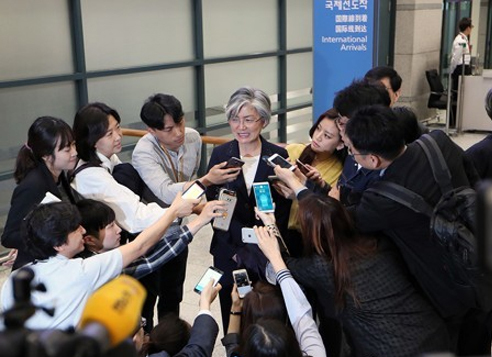INCHEON -- President Moon Jae-in's nominee for the country's top diplomat said Thursday that humanitarian aid to the North should be provided regardless of political considerations.
Kang Kyung-wha, recently tapped to lead the foreign ministry, still emphasized that it is necessary to seek "more powerful" sanctions against North Korea in case the regime carries out additional provocations.
"It is a universal value to provide humanitarian aid to where human beings are suffering. It is also the principles of the UN to (seek) it separately from any political considerations, and I think that we should do so," Kang told reporters at Incheon International Airport, west of Seoul.
 |
Kang Kyung-wha (center) (Yonhap) |
Kang made the remarks upon returning home from New York. She had worked at the United Nations for about 10 years.
Asked whether she believes humanitarian aid to the North should be provided despite Pyongyang's continued provocations and nuclear aspirations, she said yes, adding that it is in line with the spirit and principles of the UN to extend help to those in need.
Since liberal President Moon took office May 10, there has been a change in mood regarding providing help and assistance to the impoverished Northern neighbor.
Moon has said that he will push for a "two-track" approach toward the North in which he seeks sanctions against provocations and at the same time engagement and dialogue aimed at tackling the nuclear stalemate.
In line with Moon's policy, she said, "Should there be additional provocations, I think more powerful sanctions are needed."
She didn't go into details, saying she will share her thoughts on major pending issues, including the North's nuclear and missile threats after studying more.
Kang's nomination, announced Sunday, came as a surprise as she, if confirmed, would be the first female foreign minister in South Korea and also the first time in 14 years in which the ministry would be headed by a person who didn't start as a career diplomat.
Kang is known for having in-depth understanding of human rights as she worked at the UN for years in relevant fields. But some critics worry that she lacks experience in handling the North's nuclear and other major challenges.
She dismissed the concerns, saying that she had experience in dealing with the North and its nuclear problem up close when she served as an interpreter for three years for the late President Kim Dae-jung known for his "sunshine policy" of engaging the North.
Asked about her stance on a controversial deal that South Korea and Japan reached in 2015 to put an end to their long-running row over the "comfort women" issue, Kang didn't respond, only to say that she needs to "study" major diplomatic issues.
Comfort women refer to the victims, mostly Korean women, who were forced into front-line brothels for Japanese troops before and during World War II. Japan ruled Korea from 1910-45.
In December 2015, the Asian neighbors reached a deal to resolve the long-running dispute once and for all. Under the deal, Tokyo expressed an apology and agreed to donated 1 billion yen ($9.97 million) to a foundation dedicated to help the victims.
It still has ignited protests in Korea with critics doubting the sincerity of Japan's apology and claiming that it was hastily arranged without sufficiently seeking the opinions of victims. They called for its nullification.
In a telephone conversation with Japanese Prime Minister Shinzo Abe after his inauguration, President Moon made clear that most South Koreans cannot accept it emotionally.
Kang's nomination has beefed up expectations that the government would seek to renegotiate the deal given her career mostly focused on human rights.
Her confirmation hearing will likely be held in mid-June at the latest though parliamentary approval is not required.
Family issues, such as her daughter's dual nationality and a fake residential registration, mostly used in Korea for a favorable school assignment for children, are expected to be targets of attacks during the hearing. Kang said that she will provide detailed explanations on such issues during the upcoming hearing.
The nominee will start preparations for the hearing at a temporary office set up in central Seoul right away, government sources said.
Later in the day, Kang said she will meet with the victims of Japan's sexual enslavement, suggesting her interest in the human rights issue.
"During my last vacation here, I tried, but failed to meet with (them) ... I'm certainly going to make it when there's a chance," she told reporters on her way to her office set up to prepare for the parliamentary hearing. (Yonhap)







![[Today’s K-pop] Blackpink’s Jennie, Lisa invited to Coachella as solo acts](http://res.heraldm.com/phpwas/restmb_idxmake.php?idx=644&simg=/content/image/2024/11/21/20241121050099_0.jpg)
